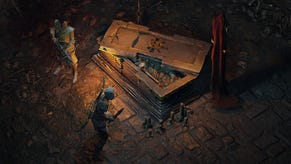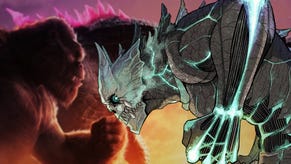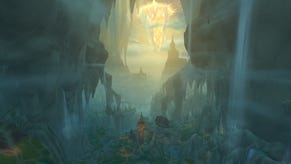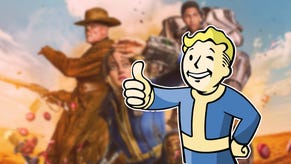Show-and-Tell at E3: Supergiant's Rao on Bastion
Bastion is a video game with its own narrator. A recipe for round-the-clock annoyance? Sheer brilliance? Both? We played the game and spoke with Supergiant Games to find out.
The E3 show floor is an incredibly shitty place to try out games. Thousands of people swarm, stomp, and chatter, creating a cacophonous din that pretty much steamrolls immersion – and, in some cases, basic sanity. Meanwhile, booth babes strut about, desperately hoping to lure you into some horrific ad-based trap, and PR reps bore holes into the back of your head as you play – silently judging your naked, perhaps somewhat-lacking gaming skills as they flap loosely in the breeze. In the comfort of your living room, games are more-than-capable of whisking you away to another world. But when you've been physically whisked away to E3's world, you're lucky to find a game that won't come up as the root of one of your many crippling phobias some years later during intensive therapy.
For me, Bastion was the exception. Here's the thing, though: to be perfectly honest, I wasn't expecting much coming into it. To make matters worse, I'd just walked out of a hands-on session with Batman: Arkham City, which – somewhat ironically – had nearly convinced me to take up a life of crime if it meant owning just a tiny morsel of the game right that very second.
Then I picked up the controller, and – just like that – I was gone. In another goddamn world. This 2D isometric hack 'n' slash had beat up numerous triple-A titles, taken their lunch money, and hung them from flagpoles so they'd have a better view of it being everything they'd ever wished they could be.
Put simply, Bastion was different. Even surrounded by a packed LA Convention Center – my gigantic, screaming fire hazard of a home away from home – it felt like a place I'd never visited. The game was fun, sure, but it absolutely oozed atmosphere. Gentle acoustic guitar music, a gorgeously bright color palette, a world that built itself as I moved forward, and – perhaps most essentially – a narrator painted an incredibly deliberate, subtly powerful picture.
“Hold the phone,” you might be thinking. “A narrator? In my video game? Truly, god is a spiteful being.” I was skeptical at first too, but believe me: it's a stroke of genius. Between smart, occasionally hilarious writing and a voice that compares favorably to Morgan Freeman, the narrator's near-constant dynamic commentary on your hacks, slashes, and unintentional leaps off the face of the world never grates.
Instead, a game that might otherwise emulate the solitary, indie-vogue vibe popularized by games like Limbo feels strangely friendly and inviting. No doubt about it: in an industry inundated with “intense, visceral” triple-As and “ephemeral, unsettling” indies, Bastion's breaking new emotional ground. Speaking with developer Supergiant Games, the reason why quickly became apparent: this definitely isn't just some throwaway gimmick.
"When you do, like, Uncharted or any of those things, you don't get 50 chances with Nolan North."
“For us, our process at the beginning was just to sort of prototype and keep supporting what was working – and kind of cut or leave off to the side what we or other players weren't responding to. So narration became a very central part of the game from about January or February or something. We were working and iterating on it basically four months into development,” lead designer Amir Rao told VG247.
“So yeah, it was a pretty organic process. We could have Logan record with Darren – our audio director – like three times a week. When you do, like, any triple-A game – Uncharted or any of those things – you don't get 50 chances with Nolan North. You probably get a few. So, for us, having our voice actor be essentially part of the team was a big part of our advantage, because we could just keep changing it – keep making it better and better. Some levels had over a hundred lines written for them, and in the final game, they have a third as many.”
Apocalypse Earlier
Many games task you with saving the world. At Bastion's outset, it kind of already ended. Whoops. Everyone you knew and loved is dead, and the narrator's not above crushing your soul once or twice to drive the point home. But why? What happened? Bastion – foremost – is a game of discovery. Just as tiles of all shapes and sizes rise up to populate an otherwise almost empty game world, Bastion's about filling in blanks.
“You're coming into the place after The Calamity happened,” said Rao. “You don't have a sense of what it was like before, but we as developers have to know, right? Because we're making these spaces – we're populating them. What this place was like before the Calamity and what it's like after is the central mystery of the game.”
“So, for us, a lot of this backstory won't come through directly in the game, but much of it will; you'll be able to see in both the environment and narration – even the equipment descriptions and the spirits you find – allusions to the way the world once was. We try to keep the story details pretty close to our chests, because there is a central mystery to explore, and part of the fun is the uncovering of that.”
To me, that's what Bastion did best. It made me want to know more – to delve deeper. Its 20-minute demo dropped numerous hints about a quaint-yet-vibrant world that'd been alive and kicking mere moments earlier (even the game's loading screen had glyphs from a language created specifically for the game), and I was hooked by the tantalizing prospect of piecing everything together.
The game's central story conceit, then, dovetails perfectly with your character's main goal: to walk up to The Calamity and say, “OK, come on now. Spit it out. Yes, the whole of existence. Now go to your room” by collecting a series of cores for individual areas. In the process, of course, you'll beat the stuffing out of baddies of all shapes and sizes, because an action-RPG about one brave boy's epic attempt to go on a long walk wouldn't be too terribly interesting.
That said, Bastion's no simple Diablo clone. After bashing a few scythe-wielding ghost-like enemies with my giant hammer, I acquired a repeater gun and a bow-and-arrow. All three weapons had their own control schemes, and each was completely upgradable. (Apparently, a total of ten will be available in the final game.) Before long, I found myself roll-dodging a giant boss ghost who broke the world with each swing of his tile-smashing weapon, narrowly dodging turret bullets, and screaming for the hills as the core-less area around me basically went nuclear.
Again, that all took place in the span of roughly 20 minutes. For Bastion, then, variety's everything. Just because the genre's called “hack 'n' slash,” that doesn't mean those are literally the only activities you should be performing. So said Rao:
“Yeah, [variety's] a huge thing... We try and make sure that every area you go to has multiple hooks – some interesting piece of play to hang the rest of the design, narration, and feel on. For us, that was really important. I don't want to spoil what the other hooks are, but I can say with confidence that every area you visit has some unique thing that makes its own special-feeling play experience – in addition to just being a new environment with new enemies.”
“And I think the reason we did that is we come from RTS games. In RTS games, campaigns are generally super weak when they're just the core game experience rehashed over-and-over. RTS games require structuring and making your objectives unique and interesting – which is something I think the StarCraft II campaign did really well. For us, your goal is always the same – which is to find the core. It was important to keep the goal consistent, but the means of achieving it pretty varied.”
Adventure time
Core in hand and prospect of a horrific death at least temporarily postponed, I emerged at the Bastion proper. Using what little power one core granted, I was able to bring back an armory and un-fry my nerves with a quick shopping trip. Also, I met the narrator, who seemed to be having a nice enough time chilling out by the Bastion and being the only other living human in existence. After that, it was time for the demo to end – though Rao emphasized that your arrival at the Bastion is the game's real beginning.
“So basically, the game opens up a lot after the prologue,” he explained. “The prologue is sort of your introduction to the game mechanics and the feel of the game. Right at the end of the prologue, when you get to the Bastion and you get to build your first structure, the game opens up there because you get to what's essentially an over-map.”
“And you can sort of pick which levels you want to tackle in what order. Some of those are places where you're trying to find these cores, and others are more challenge focused kind of moments where it's testing a certain weapon or something else. And there's also hidden content and material that you can access through various means... So it's kind of non-linear from a structural perspective after you get to the Bastion. And beyond that, in certain levels, there's less linear level designs too.”
Taken along with Bastion's fast-paced, dodge-heavy combat and hook-centric levels, that degree of deliberately crafted variation is on track to separate Bastion from a resurgent, but sadly same-y action-RPG pack. Certainly, the risk of repetition always looms with this sort of game, and Bastion's combat didn't feel quite as satisfyingly skull-shattering as the genre's top standard-setters.
Those things aside, however, Bastion showed an absurd amount of promise. More so than anything else I saw during E3, the game made me feel something – even surrounded by a crowd so densely packed that it only needed a tone-deaf man shouting “Jason” to put me in the fetal position.
That unique emotional impact, Rao said, sprouted from the seeds of small-time development. They may be called Supergiant, but for Rao and co, size really doesn't matter.
"I think that's part of the feeling you get when you play an independent game, and you're like 'Yeah, this feels like people made it.'”
“In short, we could never have made a game like this at a company like EA,” he said. “We needed to be able to take creative risks. And we needed to be able to be bold. And we needed to be able to be really fast. You can only be really fast when there isn't a lot of management overhead – where people are free to pursue whatever ideas they have for something without having to check with someone first. Also, to be collaborative by talking and working together quickly on stuff.”
“To me, with my favorite games, the love or the craft of the developers generally shines through. I think that's something people kind of identify in independent games, because it seems to happen there more often than not. When I play a game like Castle Crashers or Braid, it feels like someone's handcrafted work. Maybe it's the 2D-ness of it, or maybe it's part of the play experience, tone of the world, or play mechanics. It's an identifiable but hard-to-pin-down thing.”
“And it's not to say triple-A games don't have that,” he added. “They certainly do. You know, some may have more than others, but it's really hard to feel a lot of the time, right? A lot of those guys may love what they do, but it's really hard for their voice to be a part of the game. Like, Greg does all the writing in [Bastion]. Jen does all the 2D art in it. Darren does all the music. Logan is the voice. And between our two engineers, they have control over the entire experience. I think that's part of the feeling you get when you play an independent game, and you're like 'Yeah, this feels like people made it.'”
He's right, you know. I was totally like that.
Bastion is a downloadable title on Xbox Live Arcade. It's coming out on July 20.







_ddwYK80.png?width=291&height=164&fit=crop&quality=80&format=jpg&auto=webp)



